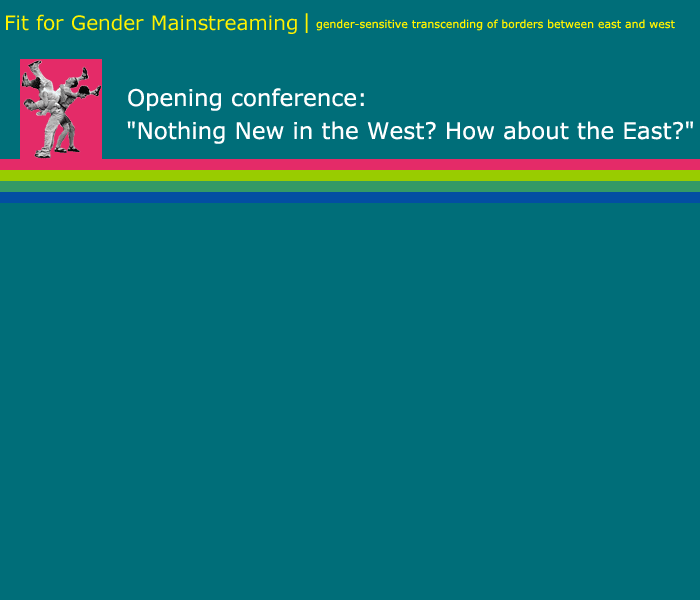Parallel workshop discussions
10:00 am – 1:00 pm
Workshop 1
Actors for Change? Men and the Politics of Equal Opportunity
Including: Ingvar Hjärtsjö (Mänliga, Sweden), Willi Walter (Forum
Männer, Berlin, Germany), Margarete Kreimer (men’s counseling, Graz,
Austria)
Actors in non-governmental men's politics from Poland, Austria, Sweden
and Germany present different approaches to men's politics. Discussions will
focus on possibilities for creating synergies and networks. What role can and
should men's politics play in future EU equal opportunity policies?
Workshop 2
Gender Politics from Childhood Onwards – the Potential
for Change through (School) Education Policies – a European Comparison
Including: Rainer Domisch (Department of Education, Finland), Bielefelder Laborschule,
Adelheid Berghammer (Gender Mainstreaming Commissioner at the Pedagogical Institute
in Upper Austria)
The foundations for gender hierarchies as well as gender democracy are laid
in pre-schools and schools. This is where gender roles and gender relationships
are practiced as part of children's socialization. We want to debate the
possibilities offered by state educational policies and different feminist
and/or gender democratic approaches with regard to a gender-fair development
of curricula and didactics as well as teacher training and find out about
various strategies and methods to introduce gender-fair education.
More informations:
1.]
'
Geschlechterpolitik von Kindesbeinen
an', (
Download
->> PDF)
Vortrag von
Uli Boldt
2.]
'
Neue Wege für Jungs', (
Download
->> PDF)
Vortrag von
Uli Boldt
Workshop 3
Give Us Time! – (Local) Time Politics as Gender Politics
Including: Alessandra De Cugis (Milan, Italy), Ulrich Mückenberger (University
of Hamburg), Imke Meyer (Women's Commissioner of the city of Hanau, Germany)
Coordinating a professional and a family life and achieving a gender-fair
division of labor in both areas of life is more than just a question of money
for women and men, it is also a matter of time and social conditions and
opportunities. In both areas, outside forces determine how much time is available.
We want to explore approaches to local time politics that aim to achieve
a more efficient organization of "time in the city" and give us
greater freedom to determine our own use of time. What is the potential of
time-based approaches for emancipative gender politics?
More informations:
1.]
'
Gendermainstreaming und lokale
Zeitpolitik' (
Download
->> PDF)
Vortrag bzw. Arbeitspapier von
Ulrich Mückenberger
2.]
'
Familiengerechtes Hanau — Eine Stadt baut "Zeitbrücken" zur
Vereinbarkeit
von Beruf und Familie',
(
Download ->> PDF)
Vortrag von
Imke Meyer (Frauenbeauftragte der Stadt Hanau)
3.]
'
Give us time' (
Download
->> PDF)
Präsentation von
Alessandra de Cugis, Mailand
Workshop 4
Mind the (Pay) Gap! – Equal Opportunity on the Way to Lisbon
Including: Catelene Passchier (ETUC Brussels), Friederike Maier (FHW Berlin),
Gundel Köbcke (Twinning Light Project in the Czech Republic)
According to the Lisbon Strategy, women's employment in the EU should rise
to 60%. But what is the role of qualitative equal opportunity objectives:
the same pay for the same (value of) work? Working time models? Earning an
independent living through gainful employment?
We want to shed light on the role of the equal-pay principle in EU equal
opportunity policies and European social dialogue, a principle which aims
to combat the causes for the ongoing gender pay gap that places women at
a disadvantage. We will also examine approaches for greater pay equality
in individual member states.
Workshop 5
(Never)ending Modesty – Are We Satisfied with Equal Opportunity
Politics in Europe?
Including:
Gender politics – equal opportunity politics – women's politics – gender
justice – gender mainstreaming – emancipation… It is often
hard to clearly differentiate between the growing number of terms that are
used in connection with various gender-based approaches in political fields
in Europe and around the world. Yet there is one word that is increasingly
seldom heard and has almost fallen into disuse: "feminism" – as
a term and a sociopolitical concept for change. This comes despite the fact
that feminist movements are the starting point across the EU for emancipative
changes, future-oriented analyses, and demands for equal opportunity policies
in the EU. Have gender politics replaced feminism? Is it a continuation, and
if so, what type of gender politics?


